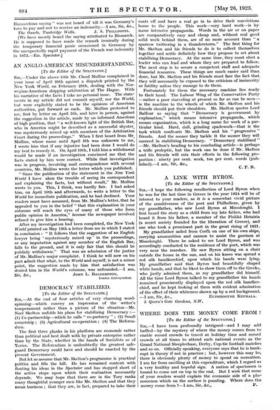AN ANGLO-AMERICAN MISUNDERSTANDING.
[To the Editor of the SPECTATOR.] Sin,—Under the above title Mr. Claud Mullins complained in your issue of April 28th against a dispatch printed by the New York World, on February 28th, dealing with the Nor- wegian-American shipping arbitration at The Hague. With his narrative of the facts I take no personal issue. The state- ments in my article did not commit myself, nor the World, but were explicitly stated to be the opinions of American authorities, put forward as such. Mr. Mullins protested to me, first by letter on April 5th, and later in person, against the suggestion in the article, made by an informed American of high position, that " a well-known light of the British Bar, who in America might be described as a successful shyster, was mysteriously mixed up with members of the Arbitration Court during the proceedings." When I first heard from Mr, Mullins, whose name until April 5th was unknown to me, I wrote him that if any injustice had been done I would do my best to remedy it. On April 10th, I told him a withdrawal would be made if an investigation convinced me that the facts stated by him were correct. While that investigation was in progress, involving mail correspondence with several countries, Mr. Mullins wrote the letter which you published.
" Since the publication of the statement in the New York World I have aken the trouble of seeing its correspondent and explaining the facts, but without result," Mr. Mullins wrote to you. This, I think, was hardly fair. I had asked him, on April 10th and afterwards, to write a letter to the World for immediate publication, and he had declined. Your readers must have assumed, from Mr. Mullins's letter, that he appealed to you in the belief " that this explanation in your columns will reach the eyes of many of those who form public opinion in America," because the newspaper involved refused to give him a hearing.
After my investigation had been completed, the New York World printed on May 18th a letter from me in which I stated in conclusion : " It follows that the suggestion of an English lawyer being ' mysteriously mixed up ' in the proceedings, or any imputation against any member of the English Bar, falls to the ground, and it is only fair that this should be publicly withdrawn." That was an admission of the justice of Mr. Mullins's major complaint. I think he will now on his part admit that what, to the World and myself, is not a minor point, the suggestion made by him that satisfaction was denied him in the World's columns, was unfounded.—I am,
London Correspondent.










































 Previous page
Previous page